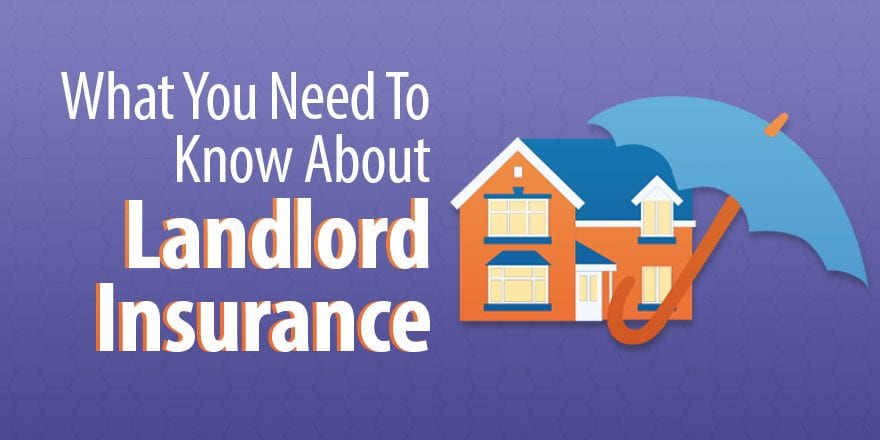Landlord Insurance Policies and why you must buy one

Homeowner insurance policies often cover damage to your home, its contents and liability costs in the event of an accident or third-party injury.
However, coverage for some risks remains limited, especially if you own a rental property.
A landlord insurance policy can provide you with an extensive suite of benefits that extend your protection to tenants and their belongings. This type of policy typically covers property damage caused by natural disasters, malicious acts, or extended periods of vacancy.
If you’re a landlord with rental properties as part of your investment portfolio, it pays to review your risk exposure before negotiating rates and terms with prospective insurers.
Landlord Insurance policies and why you must buy one
Here are just a few reasons why you need landlord insurance.
Protection from property damage
Landlord insurance protects your rental property against specified hazards.If your rental home suffers damage due to a covered peril, you will receive a claim payment that covers property repairs and/or replacement costs, as well as other expenses related to the incident.
Only a few policies provide full coverage for any damage to the property.
Most policies require you to pay a deductible, which is intended to reduce your premiums.
Landlord insurance also provides protection against loss of income due to tenant relocation, repair delays, or cancelled bookings.
This is especially important if your rental property is part of a vacation rental.
Protection from liability costs
Liability coverage is an important part of every landlord insurance policy. Liability protection covers legal costs and settlements related to injuries and property damage on the premises.
While your homeowner’s policy may provide limited liability coverage, it often provides less than what you need.
While most policies provide coverage up to $500,000 or more, the average liability claim exceeds $30,000.
Some policies may offer additional coverage for specific risks, such as animal bites, water damage, glass breakage, or workers’ compensation claims. While these are all important, the most common liability triggers are slips, trips, and falls due to broken walkways or faulty staircases.
A faulty electric wiring or a faulty hot water heater can also prompt a liability claim.
Covers natural disasters and malicious acts
Landlord insurance can help you protect your investment from unexpected natural hazards and malicious acts. For example, a tornado, hurricane, or flooding can wreak havoc on your property, as well as on your tenants’ belongings.
If you have no coverage, you will have to absorb the cost of repairs, rebuild the property, and replace or repair damaged belongings.
With landlord insurance, you receive a payment to cover these unexpected expenses.In addition, many policies cover losses due to fire, smoke, vandalism, theft, and robbery.
Some policies also provide protection against malicious acts such as the misuse of chemical compounds or illegal use of your property.
Extended periods of vacancy
Landlord insurance provides protection when no one is residing in your rental property.
Some policies provide coverage for extended periods of vacancy, while others don’t. If your policy doesn’t provide coverage for extended periods of vacancy, you need to purchase a separate rider.
Damages can occur as a result of vandalism, theft, and extreme weather. If you don’t have insurance, you’ll have to pay for repairs out of pocket.
Some policies may provide you with money to cover the cost of repairs if there’s no damage, allowing you to keep the funds from the tenant’s deposit to help defray repair costs.
If you have a homeowners policy, you might be able to get coverage for vacant periods for an added cost.
Types of landlord insurance
There are many types of landlord insurance, each with its own specific benefits. However, the types of landlord insurance policies vary based on the number of units covered, the amount of insurance provided, and the policy’s deductible amount.
#1. Single-Unit Policy:
A single-unit policy insures a single rental property, such as a single-family house or apartment building. These policies have a standard amount of coverage per unit and an average deductible. You can customize a single-unit policy to suit your specific needs.
#2. Multiple-Unit Policy:
A multiple-unit policy insures a group of rental properties, such as several apartment buildings. These policies provide a standard amount of coverage for each unit and an average deductible amount per unit. You can customize a multiple-unit policy to meet your specific needs.
READ:Job Vacancy For Cabin Crew III
#3. Specialty Policy:
A specialty policy covers only certain risks, such as earthquake coverage or damage caused by floods and hurricanes.
You can customize a specialty policy to suit your specific needs. Some specialty policies also provide coverage for damage caused by terrorism.
Loss or Damage to the Property During Vacancy
A vacancy policy provides coverage for any damage to your rental property while it’s empty.
If your rental property is left unoccupied for a long period of time, you may want to consider purchasing a vacancy policy.
A vacancy policy protects your property from vandalism, theft, damage caused by weather, and other losses that may occur while your rental property is unoccupied.
A vacancy policy also covers expenses associated with boarding up, cleaning, and repairing damage to your rental property.
If your rental property suffers significant damage while it’s unoccupied, a vacancy policy may help you recoup those expenses.
Landlord Insurance policies and Liability Protection for Guests or Employees
Landlord insurance provides liability coverage for your guests and employees.
A standard policy covers your guests and employees who are injured on the premises due to your negligence.
You may also want to consider purchasing an additional coverage for pets and petsitting services.
Some policies provide coverage for third-party liability claims, such as lawsuits related to slip-and-fall incidents or damage to guest property.
Other policies provide coverage for employee claims, such as workers’ compensation benefits, job-related injuries, and wrongful termination lawsuits.
READ: Homeowners Insurance: A key insurance decision for your property
Conclusion
Landlord insurance policies provide a variety of coverage options that extend beyond the cost of repairs and replacement due to damage to the property.
A landlord insurance policy is designed to protect landlords from a variety of potential risks, including natural disasters and malicious acts, extended periods of vacancy, and third-party injuries and damages.
Undoubtedly, insurance is an essential part of any business, yet it is often neglected.
If you are a landlord, it is important to make sure you are adequately covered so that you can continue with your business uninterrupted.
Send Stories | Social Media | Disclaimer
Send Stories and Articles for publication to [email protected]
We Are Active On Social Media
WhatsApp Channel: JOIN HERE
2024 BECE and WASSCE Channel - JOIN HERE
Facebook: JOIN HERE
Telegram: JOIN HERE
Twitter: FOLLOW US HERE
Instagram: FOLLOW US HERE
Disclaimer:
The information contained in this post on Ghana Education News is for general information purposes only. While we endeavour to keep the information up to date and correct, we make no representations or warranties of any kind, express or implied, about the completeness, accuracy, reliability, suitability or availability with respect to the website or the information, products, services, or related graphics contained on the post for any purpose.



 Asogli State rejects renaming Ho Technical University after Ephriam Amu
Asogli State rejects renaming Ho Technical University after Ephriam Amu  KNUST Pro Vice-Chancellor makes donation of $10,000 To GReF
KNUST Pro Vice-Chancellor makes donation of $10,000 To GReF  Lydia Alhassan provides free transport for UG level 100 students
Lydia Alhassan provides free transport for UG level 100 students  How to buy UG Admission Voucher with Momo/Shortcode
How to buy UG Admission Voucher with Momo/Shortcode  The Poll Tax Ordinance of 1852
The Poll Tax Ordinance of 1852  Top 5 Universities in the Netherlands for Masters Studies
Top 5 Universities in the Netherlands for Masters Studies